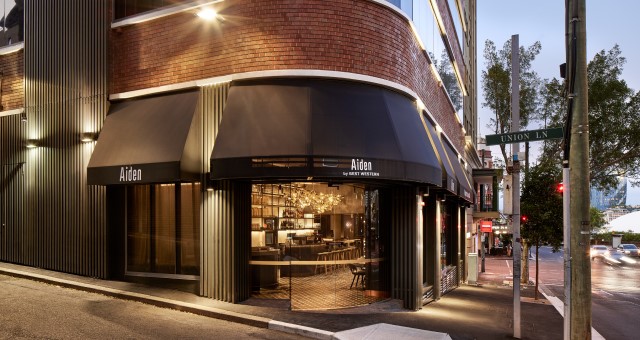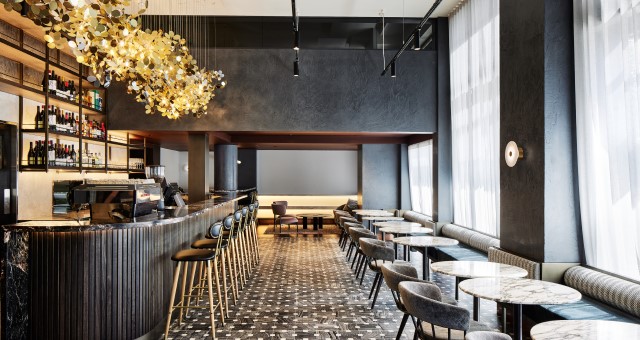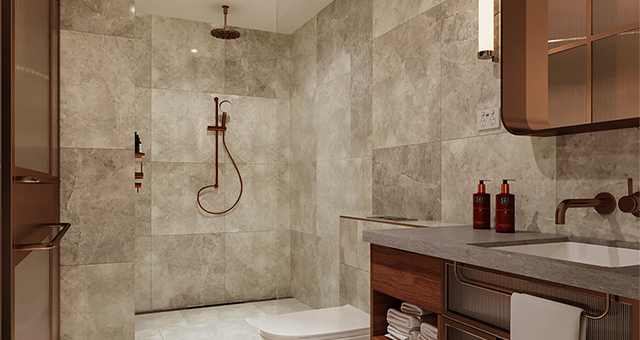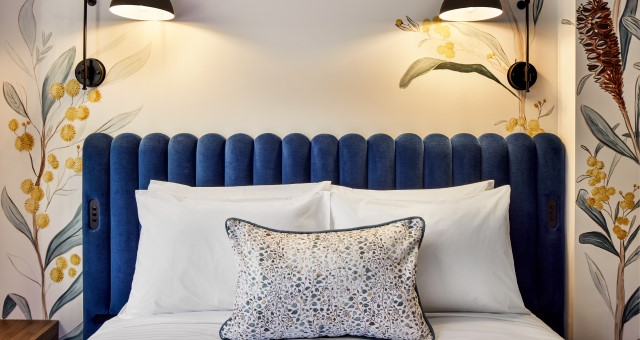When the Chen family purchased 45 Murray Street, Pyrmont back in 2005, it was simply an office block, and remained so for a couple of years before renovations began to turn it into a boutique hotel. But the walls of this art deco building hold a lot of history.
Dating back to around 1938, the property was originally built as a cereal and grain store.Back then, Darling Harbour was home to tram and rail yards and was a place where cargo was loaded onto ships.
“Pyrmont used to be an industrial yard, a working-class suburb, and this building was reflective of the industry around it,” Chen explained.
Later, during the 60s and 70s, the building served as the headquarters of appliances company Breville, and even during the most recent renovation, traces of the company remained.
“When we were breaking down the walls to convert this building to a hotel, we discovered a Breville employee had stuck a calling card on one of the walls. It read: ‘The Breville headquarters will be moving to …’ and the date. I’ve got that card somewhere it says September 6, 1979,” Chen said.
A love for travel, hotels and the hospitality industry prompted Chen to convert the property into a hotel, but he wanted to do so in a way that preserved the integrity of the building.
“We always wanted a classic but contemporary style, bringing it into the modern era but retaining a lot of the design elements that reflect the art deco history of the building,” he said.
Today, original art deco elements are still clearly visible in the red brick exterior and curved corner facade, complemented by the addition of many brass elements, studded barstools, rich red marble and bronze-coloured taps.
By travellers for travellers
Aiden Darling Harbour prides itself on being a hotel designed by travellers for travellers. Over the course of five years, Chen took note of his own accommodation experiences and all the things that he believed could be improved upon.
“You know some of these small pet peeves? I had a big list of all the things we wanted and didn’t want in our hotel rooms,” he explained.
“We provide all the things that you want, and we strip out all the things that you don’t need.”
A simple but important addition for guests was water fountains, dispensing both still and sparkling, on every level, and two big glass bottles prefilled and stored in the fridge, because as Chen says, “nobody wants to spend $7 on water from the minibar”.
Clothes steamers and Chromecast are also standard features in each room.
Chen believes that aesthetics can only go so far, and that experience and service are what really matters to guests.
“It’s stuff like that we have built into the physical that people can remember as an experience,” he said.
“What travellers will remember is those times when they were made to feel special, and it’s always to do with the service. Service is our number one asset.”
In aiming to deliver the best experience for guests, Aiden focuses on three important things: “awesome location”, “extremely comfortable bed” and “excellent shower and amenities”.
“Those are the basics that you should really get right,” Chen said.
“What are we expecting as travellers? Personally, it’s not the bellboy at the front door that takes your luggage and expects a tip. What I want is to be able to feel completely comfortable and not be forced into buying or doing certain things that I don’t want to.”
One of the reasons behind Aiden’s thoughtful design, is the compact nature of its hotel rooms, which aim to deliver better value for money for guests.
“Unless you’re celebrating, you’re going to be wanting value for the dollars that you pay for accommodation,” Chen said.
“You could stay in a very big room but you’re still tripping over your luggage because someone hasn’t thought about where to put it and it variably ends up in the walkway.
“Our design has been inspired by the more compact rooms in all the great cities of the world where space is at a premium. When you stay in those hotels you can’t help but be impressed by the thought that has gone into it.”
Leaning into localism
Aiden focuses on delivery a localised guest experience, with everything from the wine and beer to the fresh produce sourced locally where possible.
“Our bread is from a bakery that’s about 500 meters down the road,” Chen notes.
“We want to not only bring in as many parts of the neighbourhood as possible, we also want to open ourselves up to the neighbourhood.”
This theme of localism physically manifests itself in the design, particularly in the ground floor lobby where floor to ceiling windows allow guests to feel part of the neighbourhood around them. And it works both ways.
“We try to engage our neighbours as much as possible,” Chen said.
“We give them codes for stays, free coffees if they have breakfast … We have a good set of locals treat the lobby as their second living room, and professionals working around the area treat it as their second meeting area. That’s what I really love to see.”
Chen believes this localised guest experience is the key reason behind Airbnb’s success.
“People want to feel like a local in other cities,” he said.
“When you walk up to your apartment and say ‘Hi’ to the neighbours … it’s yours and you’re in the middle of the action. That’s a more visceral and authentic way of experiencing the city and that’s what people are looking for.”




